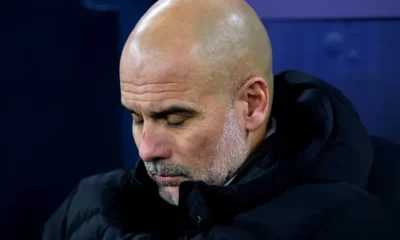Travel
Church bells ring across Magdeburg as city mourns victims of Christmas market attack
A nine-year-old child and four adults were killed and around 200 others injured, 41 of them so badly that authorities fear the death toll could rise.
The bells of Magdeburg Cathedral have been rung to remember the victims of what is being treated as a deliberate attack on the city’s Christmas market that killed five people and injured around 200 others.
Magdeburg marked the tragedy on Saturday evening with church bells across the city tolling in unison at 7:04pm, the exact time of the attack on Friday in the city of roughly 240,000 people.
The alleged attack saw a man, named only as Taleb A. in the media, drive a car into the busy Christmas market.
A nine-year-old child and four adults were killed and around 41 people have been so badly hurt that authorities fear the death toll could rise.
“There is of course the incomprehensibility of the event, the grief with the relatives, with the injured, the incomprehension of how people can do this to other people. Sometimes you almost feel like you’re watching a movie. But the fact is, it is reality,” said Regina Stieler Hinz, Magdeburg’s Deputy Mayor.
Chancellor Olaf Scholz attended the Saturday evening service at the cathedral alongside his Vice-Chancellor Robert Habeck and President Frank-Walter Steinmeier.
The driver of the vehicle, a 50-year-old doctor who immigrated from Saudi Arabia in 2006, surrendered to police at the scene.
He’s being investigated for five counts of suspected murder and 205 counts of suspected attempted murder, prosecutor Horst Walter Nopens said at a news conference.
Among other things, investigators are looking into whether the attack could have been motivated by the suspect’s dissatisfaction with the way Germany treats Saudi refugees, Nopens said.
Although Nopens mentioned the treatment of Saudi immigrants angle, authorities said that they still don’t know why the suspect drove his black BMW into the crowded market.
Describing himself as a former Muslim, the suspect appears to have been an active user of the social media platform X, sharing dozens of tweets and retweets daily focusing on anti-Islam themes, criticising the religion and congratulating Muslims who had left the faith.
He also accused German authorities of failing to do enough to combat what he referred to as the “Islamification of Europe”.
German authorities aware of Taleb A. for years
In 2013, he was convicted by the Rostock District Court of “disturbing the public peace through threats of violence” and fined the equivalent of 90 daily rates.
Furthermore, Saudi Arabia had reportedly issued three warnings to Germany about his extremist views, according to German news agencies. However, Der Spiegel reported that the specifics of these warnings remain unclear.
A year ago, German police planned to issue Taleb A. with a “Gefährderansprache”, a warning intended for individuals considered potential threats.
This measure, designed to alert individuals that they are under surveillance and deter criminal activity, was ultimately not carried out.
The reasons for this remain undisclosed, according to Tom-Oliver Langhans, director of the Magdeburg police, who spoke at a press conference following the attack.
Shock across Germany
The violence, just days before Christmas, has shocked Germany and prompted several communities across to cancel their weekend Christmas markets as a precaution and out of solidarity with Magdeburg’s loss.
“Especially these days, when the longing for love, security and an intact world is particularly strong, such an act is all the more frightening and abysmal. And somewhere we are also speechless and helpless, but volunteers, the emergency pastoral workers were on site and many helped out. And I am incredibly grateful for that,” said Magdeburg’s Catholic Bishop, Gerhard Feige.
Although many people went to the site with candles to mourn the victims, several hundred far-right protesters gathered in a central square in Magdeburg with a banner that read ‘remigration,’ German news agency dpa reported.
Berlin kept its many markets open but increased its police presence.
Germany has suffered a string of extremist attacks in recent years, including a knife attack that killed three people and wounded eight at a festival in the western city of Solingen in August.
Friday’s attack came eight years after an Islamic extremist drove a truck into a Christmas market in Berlin, killing 13 and injuring many others.
The attacker was killed days later in a shootout in Italy.
Travel
Iceland’s incoming government says it will put EU membership to referendum by 2027
Iceland has traditionally been ambivalent about joining the bloc but issues like the 2008 financial crisis, Brexit and a range of domestic issues has meant the country is slowly warming to the idea of membership.
Iceland’s new government has said it aims to put the question of EU membership to a referendum by 2027.
The incoming administration of Prime Minister Kristrún Frostadóttir, which takes over on Sunday, also said it will set up a panel of experts to look into the advantages and disadvantages of retaining the Icelandic crown over adopting the Euro.
“We agreed that a motion in parliament be agreed upon, stating that we will have a referendum on the continuation of Iceland’s European Union accession talks and that this referendum be held no later than 2027,” said incoming Foreign Minister, Þorgerður Katrín Gunnarsdóttir.
Gunnarsdóttir also heads the pro-EU Liberal Reform party and is widely expected to spearhead any accession talks.
According to a poll conducted by market research company Maskína in June, support for EU membership among Iceland’s population is growing.
That poll found just over 54% of respondents were in favour of joining the bloc, with the majority saying they thought households would be financially better off as part of the EU.
That’s a significant swing in favour of membership in a country that has generally been ambivalent about joining the EU.
In his ‘Public Opinion on the EU in Iceland since 1980’ paper published by Denmark’s Aarhus University, Ragnar Auðun Árnason said that for much of the 1980s and 1990s, Iceland was broadly split into three equal camps regarding EU membership; for, against and undecided.
But issues like the 2008 financial crisis, Brexit and a range of domestic issues has meant that Icelanders seem to be slowly warming to the idea of joining the bloc.
And a significant majority of those polled by Maskína – 74.2% – said it was important that the issue be decided by referendum.
New government unveiled
The new government was presented to the public by president Halla Tómasdóttir at a ceremony in the southwestern town of Hafnarfjörður.
Prime Minister Kristrún Frostadóttir, who is the leader of the centre-left Social Democratic Alliance, said she aims to cut inflation and interest rates.
“This new government will face challenges united. Our first task is to stabilize the economy and lower interest rates with strong leadership in fiscal policy. In the meantime, this government will break the deadlock, and work towards greater creation of wealth in the private sector. The quality of life in the country will be increased through unity surrounding these challenges,” she said.
The Social Democratic Alliance became the biggest party in November’s snap elections, called after the previous coalition government led by Bjarni Benediktsson collapsed due to infighting.
It agreed to form a government with the Liberal Reform Party and the centrist People’s Party. It’s the first time in Iceland’s history that the leaders of all the governing parties will be women.
National broadcaster RUV reported that at 36, Frostadóttir will be Iceland’s youngest ever PM.
RUV also said that the incoming administration aims to reduce the number of government ministries in order to cut some administrative costs.
Travel
Road tripping from France to Italy this winter? You can travel again through the Mont-Blanc Tunnel
The world’s second deepest tunnel has been reopened after three months of renovations.
Planning to drive between France and Italy in 2025? You can now take the Mont-Blanc Tunnel, which links the two countries beneath the Alps, as it has been reopened after months of renovation work.
A 600-metre stretch of the 11-kilometre tunnel was completely reconstructed.
Alternative ‘scenic’ routes continue to be available but do add to your travel time. Here’s how to plan your Europe road trip around this coming year.
Why was the Mont-Blanc Tunnel closed?
Opened in 1965, the Mont-Blanc highway tunnel links Chamonix in Haute Savoie, southeast France, with Courmayer in Aosta Valley, northwest Italy.
It is part of the north-south European route E25, which runs from the Hook of Holland down to the ferry crossing from Cagliari to Palermo in Sicily.
Lying 2,480 metres beneath the Aiguille du Midi summit, it is the world’s second deepest tunnel in operation after Switzerland’s Gotthard Base Tunnel.
Various closures took place throughout 2024 to allow for maintenance work, safety drills and renovation.
In the autumn, structural renovation work took place on the vault. This was one of the first major European tunnels to undertake deep renovation work on its structure.
For 15 weeks, different reconstruction technologies were tested on two 300 metre stretches of the tunnel. More than 150 people mobilised to undertake the renovations, which took place 24 hours a day and represented more than 150,000 hours of work.
The most efficient and effective techniques could be applied to an additional 600 metre section during another closure in 2025 – however no specific dates have been confirmed.
Further works along the tunnel’s entire length are to be expected in the coming years, however the French and Italian governments are in discussion over whether to do a full tunnel closure over four years where the entire vault can be refurbished in one go, or renovate the tunnel across a couple of decades with annual four-month closures.
Alternative routes to the Mont-Blanc Tunnel
Even when the Mont-Blanc Tunnel is closed, it is still possible to drive between France and Italy on different routes.
Although these may extend your journey time, they could save you money: the one-way toll for a car use to the Mont-Blanc tunnel is €51.50 while a return is €64.20.
Around 160 km south of the Mont-Blanc Tunnel, the Fréjus Tunnel connects Modane in France to Bardonecchia in Italy, which is a good alternative route for heavy goods vehicles. A one-way trip for cars costs €54.10 and a return €67.50.
Toll payment subscriptions including the TMB card and Eurotoll cover both tunnels under the same pass. If you already hold a multi-journey discount passes then this should have been automatically extended by four months to account for the recent Mont-Blanc Tunnel closure.
Alternatively, the Tunnel du Grand-Saint-Bernard links Martigny in Valais, Switzerland, with Saint-Rhémy-en-Bosses in Italy’s Aosta Valley. The one-way toll for a car is €31.
Located further southwest, the Col du Petit-Saint-Bernard is a mountain pass linking Savoie in France with Aosta Valley. However, it can face closures due to heavy snow, so check the weather before planning your route.
To the north, the Col des Montets mountain pass, linking Chamonix with Vallorcine in France – on the border with Valais – is another route that does get hit by snow closures.
The Tunnel des Montets, a single track railway tunnel that doubles as a road, is also sometimes used when the pass is closed but often faces heavy traffic.
The scenic Mont Cenis pass between the Cottian Alps in France and the Graian Alps in Italy is typically open to traffic until November, when it closes for the winter season.
The Montgenèvre Pass connecting Briançon in France and Cesana Torinese in Italy is another option for road travel further south of the Tunnel du Mont-Blanc.
Travel
UK changes travel advice for Israel: Where is it safe to visit in the Middle East right now?
Travel advisories have been lifted after they were imposed 15 months ago in October 2023.
The UK Foreign Office (FCDO) changed official travel advice which warned against “all travel” or “all but essential travel” to the majority of Israel.
Travel advisories have changed for key tourist destinations including Tel Aviv, Jerusalem, Eilat, the Dead Sea, Galilee and Haifa. Visitors are now only advised to check advice before they travel to these areas.
The FCDO still advises against all but essential travel to areas within some parts of Israel and the Occupied Palestinian Territories including Gaza and the West Bank. It also advises against travel to areas within 500 metres of the border with Syria and Gaza.
FCDO advises against all but essential travel to the area between the Lebanon border and (but not including) Route 89 excluding Nahriyyah.
Travel advisories have been lifted after they were imposed 15 months ago in October 2023.
The updated advice says the frequency of rocket attacks has decreased significantly but warns that there is “increased risk of political tension” which could cause demonstrations and clashes around anniversaries of significant events.
“The Israeli government declared a state of emergency across the whole country on 7 October [2023] and this remains in place,” the FCDO says. It adds that international air and land borders could close at short notice and visitors should check the latest information before they travel.
Is it safe to travel to Egypt?
Escalating tensions in the region have left many concerned about travelling to neighbouring countries.
Despite lifting travel warnings for Israel, the FCDO still advises against visiting large areas of Egypt. This includes within 20km of the Egypt-Libya border – except for the town of El Salloum, where it advises against all but essential travel – and the North Sinai Governorate.
The FCDO advises against all but essential travel to the northern part of the South Sinai Governorate, beyond the St Catherine-Nuweibaa road, except for the coastal areas along the west and east of the peninsula.
Its advice is the same for the Ismailiyah Governorate east of the Suez Canal, the Hala’ib Triangle, the Bir Tawil Trapezoid and the area west of the Nile Valley and Nile Delta regions, except for:
- Luxor, Qina, Aswan, Abu Simbel and the Valley of the Kings
- the Faiyum Governorate
- the coastal areas between the Nile Delta and Marsa Matruh
- the Marsa Matruh-Siwa road
- the oasis town of Siwa
- the Giza Governorate north-east of the Bahariya Oasis
- the road between Giza and Farafra (but FCDO advises against all but essential travel on the road between Bahariya and Siwa)
- Bahariya Oasis, Farafra, the White Desert and Black Desert
Is it safe to travel to Lebanon right now?
Lebanon lies to the north of Israel and shares a border. Despite a ceasefire between Israel and Lebanese Hizballah coming into force on 27 November, the FCDO says the security environment remains unpredictable.
It advises against all travel to Lebanon and urges Britons to leave by commercial means. Foreign offices in other European countries, including Ireland and France, have also advised against all travel to the country.
Is it safe to travel to Syria right now?
The FCDO advises against all travel to Syria due to “ongoing conflict and unpredictable security conditions”. It urges all British nationals to leave the country by any practical means.
The Syrian government of Bashar al-Assad fell in early December, bringing a shocking end to his family’s 50-year reign following an offensive by Islamist rebels.
Is it safe to travel to Jordan right now?
Jordan shares a border with Israel and the West Bank as well as with Syria.
The FCDO advises against all travel to within 3km of the border with Syria but borders remain open and most tourist destinations in Jordan have been unaffected by the instability.
Some flights to Amman and Aqaba airports have been affected so it is worth checking before you travel.
-

 EU & the World6 days ago
EU & the World6 days agoZakir Hussain’s Age: How Old Is the Legendary Tabla Maestro?
-

 Sports6 days ago
Sports6 days agoMonza, Nesta confirmed: “Grateful to the company.”
-

 Sports5 days ago
Sports5 days agoJannik Sinner has one more reason to smile
-

 Sports6 days ago
Sports6 days agoWorlds, swimming Azzurri close with two more medals
-
Travel6 days ago
Switzerland unveils the world’s steepest cable car leading up to James Bond revolving restaurant
-

 Sports6 days ago
Sports6 days agoGuardiola in identity crisis: “I’m not good enough”
-

 EU & the World5 days ago
EU & the World5 days ago‘Wicked Part 2’: New Title, Release Date & More Details
-

 EU & the World5 days ago
EU & the World5 days agoHow Many School Shootings Have There Been in 2024?









